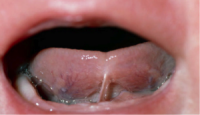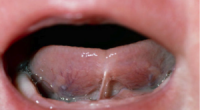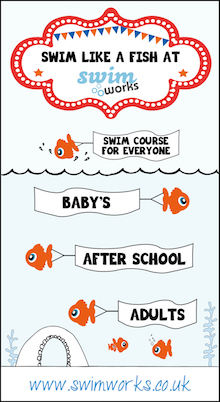My little boy was born in February with a severe tongue-tie. I’d heard about them before, I knew friends and family that had had babies with them, and I knew they may affect feeding, but I really wasn’t prepared for the first week of his life.
The first struggle we had was getting anyone to identify his tongue-tie. As a first time mother, I didn’t really know what to look for.
Breastfeeding in hospital was a disaster. As they have such limited time all the midwives would do would be to grab his head with one hand, grab a handful of my breast with the other, and push them together, hoping for a decent latch. That didn’t happen. What did happen was screaming. Very loud, painful sounding screaming. The second he got close to my breast, or was even tilted towards a feeding position, the blood-curdling scream would start. At least five midwives repeated this process and still no luck, yet no-one thought to look for a tongue-tie.
After a day of no success, and panicking that I wasn’t going to be able to feed my baby, a midwife from a trial I was involved in picked up his tongue-tie instantly.
From that moment on we established that, with his tongue as it was, breastfeeding was just not going to happen. Some tongue-ties don’t affect breastfeeding and babies learn to cope. My little boy’s tongue-tie was so severe he couldn’t stick his tongue out of his mouth at all making it virtually impossible to latch on.
One of the midwives then suggested that I start expressing. At first it was into a syringe (very tricky!) and the health assistants fed him. I was relieved that he was finally getting some food.
As my milk came in I expressed and we started offering a bottle to try and teach him how to suck. This worked and I continued to express that day. However, what I really wanted to do was to get him on the breast. On my second evening in hospital, the midwife in charge of the tongue-tie clinic came to see him and agreed that it was a severe tongue-tie that would affect his feeding. However, rather than perform a frenulotomy (cutting the tongue-tie) there and then I had to have an appointment – which was nearly two weeks away.
The next evening we came home. We had to learn very quickly how to use the steriliser and the electric breast pump as my little one was screaming for food by the time we got home.
The next couple of days were extremely difficult, with me being readmitted to hospital for pretty severe iron deficiency (although the time in hospital did finally allow me to get ahead with expressing rather than playing catch up). On the advice of some friends that had had their own children’s tongue-tie removed privately we decided to book an appointment. Feeling as I did, the thought of expressing for much longer was soul destroying.
The day after I left hospital was the day of the frenulotomy. I got myself rather worked up worrying about how much it would hurt him, and what would happen. I needn’t have worried. The woman was wonderful and had it done before we even had time to get worried. He cried a little, but she helped him latch on to me immediately (breast milk contains anaesthetic properties so he forgot about the pain almost instantly) and he had his first successful breast feed.
His next couple of feeds were just as successful, then he decided he didn’t want to do it anymore. One of my lowest points was sitting in my feeding chair, both of us in floods of tears, and the midwife turning up. Talk about feeling rubbish as a mum! Turns out it was a good job she saw that, as she was the one who suggested trying to feed with nipple shields. For anyone not in the know, it basically turns your nipples in to teats (although really designed to help with feeding if you have pain or cracked nipples). We tried them and he was straight on. Temporarily, it was a win-win situation. He thought he was taking a bottle and I didn’t have to express. The main downside was still having to sterilise the shields.
A few days into using the shields I dropped one on the floor at the start of a feed (noooo!). As my husband went to get another one my little one decided he couldn’t be bothered to wait anymore and latched on without one. From that moment we never used one again. 15 weeks later and he is still exclusively breast fed.
Now we are trying to get him to take a bottle again so I can have a rest, and he’s refusing!! Typical.
My experience with tongue-tie could have been worse, but could have been much better. About five midwives failed to identify it and just thought my son was being awkward. Continuing to cram his face into me without success, but without looking for possible reasons, wasn’t particularly helpful. I would always urge any new mothers with feeding problems to ask about a possible tongue-tie. It’s not that common, but I know a lot of people who have had children with one, so maybe it is more common than the NHS realises. There must be loads of people out there with an undiagnosed one (like my husband as we discovered) that didn’t have feeding problems, or were bottle fed anyway, so it wouldn’t surprise me if the numbers are in fact much higher.
I got lucky with one of the community midwives too. She suggested nipple shields, yet when another one came to see me she seemed to frown upon it as it doesn’t encourage a good latch (which I knew but was taking it one step at a time), so I’m sure she would never have suggested it to me had she been the one to find me in tears.
I’ve also gained an awful lot of respect for some friends of mine who expressed for months. I did it for just under a week, much of that time in hospital, and wondered how on earth I was ever going to leave the house. I’m not sure how much longer I would have carried on doing it if my son did not breastfed in the end and would probably have moved on to formula and always regretted it.
Luckily for me, my story has a happy ending, even if I do complain about hourly feeds during a growth spurt and not being able to get the massage I’ve had a voucher for for months for fear of a phonecall half way through for an urgent feed requirement!
Take It From Mummy would like to thank Hannah for sharing her story. For More information on Tongue tie you can read this post which has some useful links.
In Warwickshire we are now lucky that we do have a tongue tie service at Warwick Hospital which has only just come into place. This is a great move forward for Mums in our area but it’s clear from Hannah’s story that not enough is being done to discover tongue tie issues in babies right from the start on the maternity ward. The difference it could have made is very obvious.








